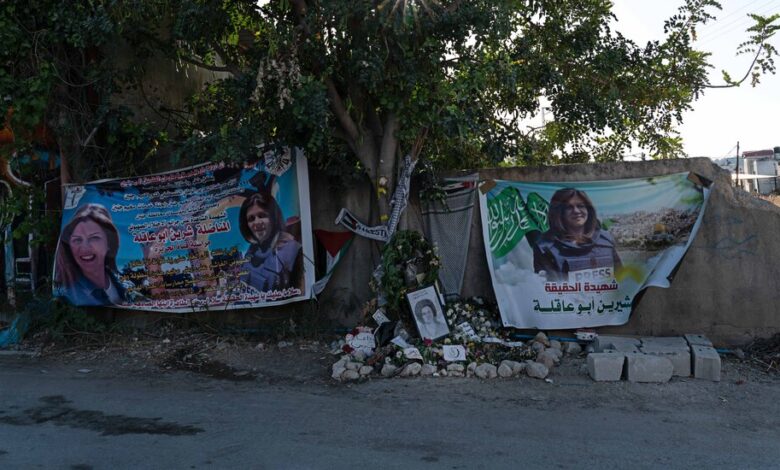In Shift, Israel Says Journalist Was Most Likely Shot by Israeli Soldier

JERUSALEM — The Israeli Army on Monday acknowledged for the first time that Shireen Abu Akleh, a Palestinian-American journalist killed in May in the occupied West Bank, was most likely shot by an Israeli soldier, but it stopped short of definitively accepting responsibility for her death.
The army’s announcement — the conclusion of a monthslong internal investigation — marked a shift from the original Israeli position, which maintained that Ms. Abu Akleh, a veteran broadcaster for Al Jazeera, had probably been killed by Palestinian fire.
Military officials nevertheless said they were certain that no Israeli soldier had intentionally fired toward a reporter or civilian, and said they would not open a criminal investigation into any Israeli soldier who might have been involved.
“It is not possible to unequivocally determine the source of the gunfire which hit Ms. Abu Akleh,” the Israel Defense Forces said in a statement. “However, there is a high possibility that Ms. Abu Akleh was accidentally hit by I.D.F. gunfire that was fired toward suspects identified as armed Palestinian gunmen, during an exchange of fire in which life-risking, widespread and indiscriminate shots were fired toward I.D.F. soldiers.”
The announcement came nearly four months after the Al Jazeera journalist was shot in the head on May 11 while covering an Israeli Army raid in Jenin, a Palestinian city in the West Bank, prompting international outrage.
The shift in the army’s position followed Palestinian claims of a cover-up, as well as several independent investigations, including by The New York Times, that found Ms. Abu Akleh was killed by a bullet fired from the approximate location of an Israeli military convoy. Evidence reviewed by The Times showed that there were no armed Palestinians near her when she was shot. The reviewed evidence contradicted Israeli claims that, if a soldier had mistakenly killed her, it was because he had been shooting at a Palestinian gunman.
The equivocal nature of the Israeli conclusion was criticized by the Abu Akleh family, who said it strengthened calls for an independent investigation by the International Criminal Court, or a new one led by the United States. The United States previously concluded that Ms. Abu Akleh was likely shot from Israeli military lines, but only by accident.
“We don’t expect war criminals to investigate their own crimes,” said Lina Abu Akleh, the journalist’s niece, in a telephone interview. “But we want the U.S. to take action. This has been our call since day one, for the U.S. to carry out an independent and credible investigation.”
She added, referring to the International Criminal Court: “This is proof to the I.C.C. that they also must carry out an investigation and a trial. We were not expecting anything from Israel, and this shows their track record and the impunity they enjoy, and the fact that the U.S. cannot hold Israel accountable for the killing of one of their own citizens.”
Ms. Abu Akleh, 51, was one of more than 80 Palestinians killed so far in 2022 during Israeli army raids in the West Bank — many of them militants, but some of them civilians.
Her killing drew worldwide condemnation, and for Palestinians it became a symbol of the daily dangers of life under Israeli occupation. Palestinian deaths rarely garner international attention, except during major escalations, and Israeli soldiers accused of crimes against Palestinians in the territory are rarely sent to jail.
But Ms. Abu Akleh was a household name in the Middle East, and her death attracted more scrutiny. She had reported on the Israeli-Palestinian conflict and Israel’s occupation of the West Bank for more than two decades.
Ms. Abu Akleh was shot while covering an increase in Israeli raids on the West Bank, a surge that has continued, and which followed an earlier rise in attacks by Palestinians that killed 19 Israelis.
She was killed while wearing a blue flak jacket and a helmet marked “Press.” Colleagues who came under fire at the same time said they had thought the army was already aware of their presence.
Israeli officials originally said it was most likely that Ms. Abu Akleh was killed by a Palestinian gunman during clashes between Israeli soldiers and militants. But a monthlong investigation by The Times found that the bullet that killed Ms. Abu Akleh had been fired from the approximate location of an Israeli military convoy early that morning, most likely by a soldier from an elite unit, corroborating eyewitness reports from the scene.
The United States concluded in July that shots fired from the position of Israeli soldiers were “likely responsible for the death” of Ms. Abu Akleh, but damage to the bullet made it difficult to draw a definitive conclusion about the gun that fired it. The United States also concluded that Ms. Abu Akleh was killed by accident, drawing outrage from many Palestinians.
The Palestinian Authority, which administers about 40 percent of the West Bank, including the city of Jenin, accused Israeli soldiers of intentionally killing Ms. Abu Akleh, and refused a joint investigation with Israel, citing distrust of the Israelis.
Ms. Abu Akleh’s funeral became a moment of unity and mourning for Palestinians, as thousands of people massed in East Jerusalem for one of the largest Palestinian funerals in recent memory.
Shortly before the funeral, several Israeli riot police officers assaulted a group of mourners carrying Ms. Abu Akleh’s coffin, causing them to almost drop it.
The Israeli police later said they had intervened because the mourners, who sought to carry the coffin by foot to the funeral, had refused to put it in a hearse as previously agreed.
Hiba Yazbek reported from Jerusalem and Patrick Kingsley from Nablus, West Bank.